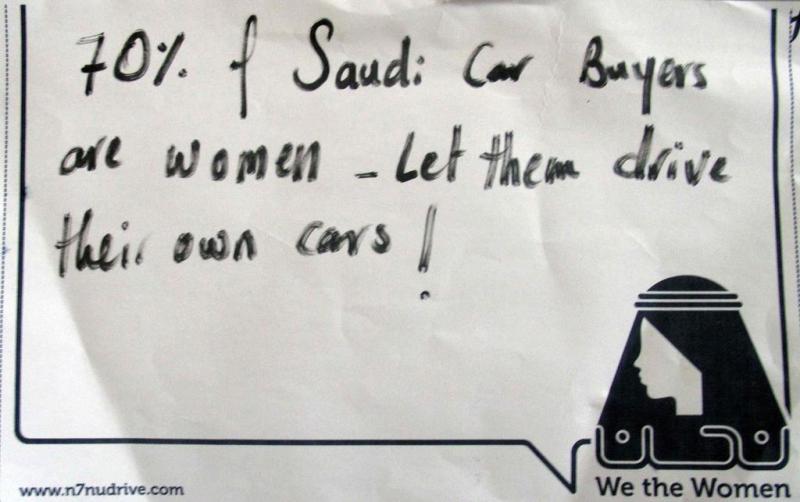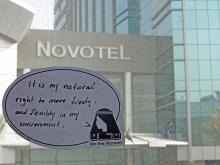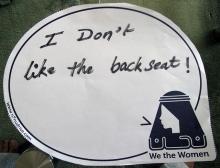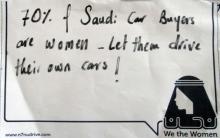We the Women (Saudi Arabia)
 Although there is no actual legislation against women driving in Saudi Arabia, a fatwa (moral law) against public "gender mixing" prohibits it. The fatwa is enforced by the country's morality police, the muttaween. Women (often carrying foreign driving licences) caught driving are taken to a police station, usually with their father or brother, to sign a pledge never to drive again.
Although there is no actual legislation against women driving in Saudi Arabia, a fatwa (moral law) against public "gender mixing" prohibits it. The fatwa is enforced by the country's morality police, the muttaween. Women (often carrying foreign driving licences) caught driving are taken to a police station, usually with their father or brother, to sign a pledge never to drive again.
In 2009, to generate social dialogue on the ban among Saudi citizens, a Saudi artist and graphic designer living in the US created a low-budget on- and offline campaign called 'We the Women'. Adapting the thesis she had produced while studying at the School of Visual Culture in New York, Areej Khan designed a set of "declaration bubble" stickers and encouraged people to print them out, fill in their thoughts, and then distribute them in public spaces -- including on cars. Supporters were also encouraged to photograph their personalised stickers and upload them to the project's Flickr set or Facebook page, or to email them to Khan anonymously.
The Facebook page was central to the campaign, becoming a central point of discussion on the issue of women driving. "Most of the people participating on the Facebook page are against women driving," said Khan. "There’s back and forth and debate on the group. I had to be prepared [for the fact that] I can’t control what this is at the end. It’s about finding a solution as a community, not what I think or am attached to."
The success and reach of the campaign was driven mainly by the people in Saudi Arabia who downloaded stickers and expressed their thoughts on the issue. By focusing on a question -- "to drive or not to drive" -- rather than a static message about women's rights, the campaign opened itself up to the participation of a much wider audience (both those for and against women driving). This prevented the campaign from being cast off as the product of just another westernised, expat Saudi woman, and generated some healthy controversy and international media attention.
At the time, Khan said that although the project received many comments opposing women driving in Saudi Arabia, "a lot of people say they think that will change soon, because of the voice given to women by projects like this."
Although no laws have changed as yet, the issue has continued to get attention, particularly after 'Women2Drive' (read our article on this campaign) started two years later.
FURTHER READING
More about the campaign on Khan's website
Saudi Women Driving Blog 2009.
Interview with Khan, CNN, 2009.
VIDEO
We the Women


